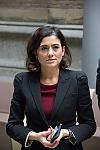Sadet Karabulut: Stop treating Islam as a case apart
Sadet Karabulut: Stop treating Islam as a case apart
If all Dutch citizens are individuals with the right to self-determination, why are some groups addressed as an alleged ethnic-religious collectivity? If Social Affairs Minister Lodewijk Asscher wants to see integration and emancipation, why, when it comes to questions of religion and integration, does he speak with foreign governments or their representatives in the Netherlands? If Asscher is to take his own words seriously, he shouldn’t be pursuing an ethnic-religious policy but a policy of integration. Integration policy begins with self-determination and with ceasing to cooperate with ethnic-religious interlocutors who are precisely the people who stand in integration’s way.
 Each Dutch citizen has the right to control his or her own body and mind. Every individual has the right to self-determination. It’s not the imam, the rabbi or the priest who has the right to determine how faithfully one relates to a religion. Individuals determine that for themselves, on their own or in groups, but always in freedom. Those freedoms, which include the freedom of expression, of religion, of association and of the press, are embedded in and secured by our constitution, and can only be maintained when everyone is entitled to them.
Each Dutch citizen has the right to control his or her own body and mind. Every individual has the right to self-determination. It’s not the imam, the rabbi or the priest who has the right to determine how faithfully one relates to a religion. Individuals determine that for themselves, on their own or in groups, but always in freedom. Those freedoms, which include the freedom of expression, of religion, of association and of the press, are embedded in and secured by our constitution, and can only be maintained when everyone is entitled to them.
Muslim believers have the right to protect their prophet against mockery and insult in a peaceful manner and with democratic methods, just as non-believers have the right to satirise that prophet’s medieval thought. Better still is the fact that we can freely engage in discussion about religion with each other in the pub or in the mosque, without the state involving itself in the question of what religion should include, or what it should forbid. The best answer to Islamicists who hijack religion for political ends or who seek to impose their religious ideas on others is to stand up for the right to self-determination, to stand up for our basic rights.
What we need to see the back of is a government policy which treats Islam differently from other religions. Why do some politicians advocate education in the Koran in public schools? Why are mosque- based boarding schools facilitated? Why does the government give subsidies and its cooperation to Salafist organisations? Why are ultra-conservative organisations such as Diyanet and Milli-Gorus seen by the government as partners? Better to put energy into excellent lessons on philosophy and religious currents to all children. The government should end language lessons in mosques and instead the state should offer high quality language courses. Make it clear to children in primary school that they themselves are the boss over their own life, conscience and thought. That is also the best answer to radical Islam, to the Islamicists who make their religion into a political vehicle to attack our open, democratic society and equal rights.
You would expect the government to know better after forty years of migrants coming to the Netherlands to find work, yet we continue to see intensive cooperation with often conservative ethnic-religious interlocutors, whether at home or abroad, on questions of religion and integration. It is as if Dutch citizens with an Islamic background are not themselves capable of deciding what they ought to believe and how they should interpret their Dutch nationality. Our government has no need to determine whether and how individuals give form to their philosophy of life, so why should the Turkish government, whether via Diyanet or by some other means, do this for Dutch citizens?
Morocco recently deported a Dutch journalist because of critical reportage on human rights. Quite rightly, our government condemned this. But why has this same government joined forces with Morocco to export so-called moderate Islam to the Netherlands? The Turkish and Moroccan governments stand for patriarchal relations of precisely the kind which Minister Lodewijk Asscher should be breaking apart instead of legitimising and perpetuating them.
A core element of integration policy should be combating segregation. The Netherlands can call itself an egalitarian society of which we are proud, yet we still have ‘black’ (in this context, in Dutch, the term includes all non-white people – translator’s note) and ‘white’ schools. The basis of integration lies in the neighbourhoods, in schools and at work. How can Asscher talk about integration, yet disregard the fact that 80% of the children of migrants in major cities go to ‘black’ schools. How can these children feel themselves to be Dutch when they are treated separately?
All individuals have the freedom within the borders of our constitutional state to be who they wish to be: whether they are believers or non-believers, homosexual or heterosexual, men or women, black, brown or white. Children born and raised here aren’t immigrants. We are all Dutch and, according to individual preferences and attributes can add other identities - such as socialist, worker, woman, Surinamese, Kurdish, Turkish or Moroccan. That’s called self-determination and must form a point of departure for integration, a process for which we are all responsible, not within our own groups but precisely outside of them, at school and in the street, where diverse individuals can meet each other.
Sadet Karabulut is a Member for Parliament for the SP and the party’s spokeswoman on Social Affairs and Integration.
This article first appeared, in the original Dutch, on 28th November 2015 in the national daily newspaper De Volkskrant.
